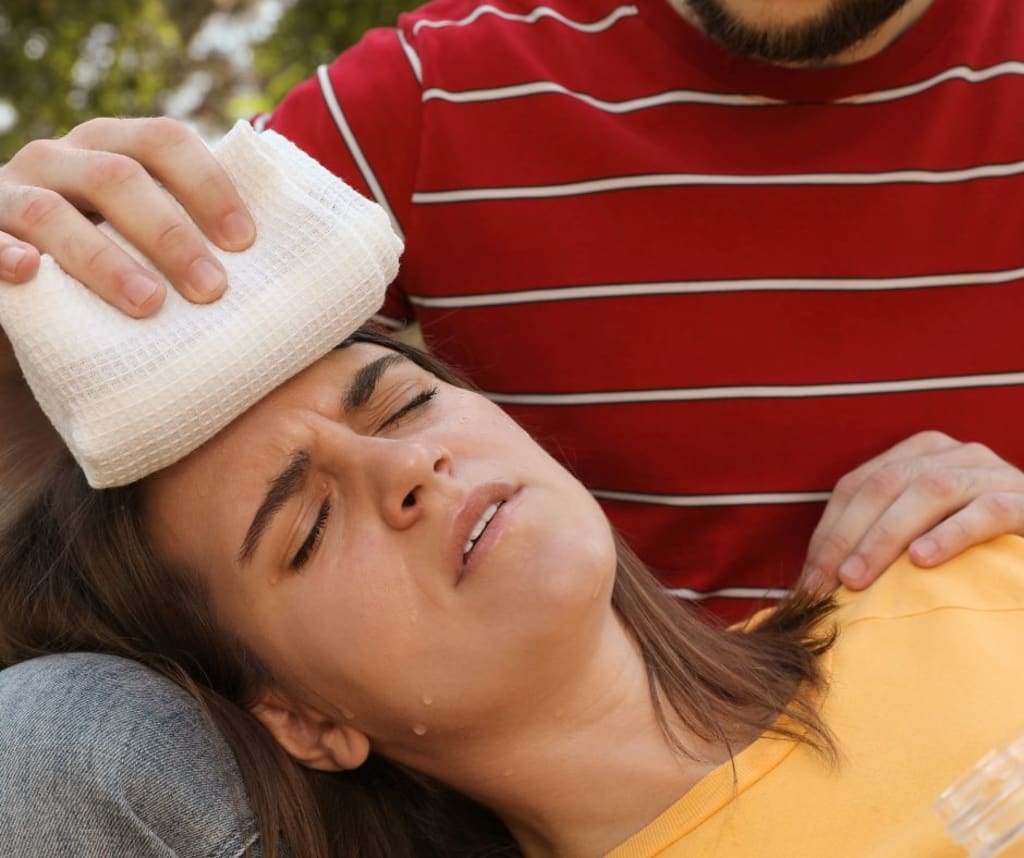Heat Exhaustion and Heatstroke in Humans
And what you can do about it.

Due to the rising temperatures as July gets closer to August, I recently wrote an article about keeping yourself cool in extreme heat. If you haven't had a chance to read it, you can check it out here.
When you spend time outside in the hot weather, you have to keep an eye out for heat stroke. It usually starts with heat cramps, which can turn into exhaustion, and then full-blown heat stroke.
Heat cramps
Heat cramps start with pain and fatigue, which usually is caused by dehydration. You may feel tired and dizzy. You may have pain throughout your body, in random places. If you feel like this, you need to find a way to cool off!
When you have heat cramps, you need to get out of the sun and get something to drink. You may want to massage your sore muscles and wait until you start to feel better before doing anything else.
Heat exhaustion
If you don't take of yourself when you have cramps, you may find yourself dealing with heat exhaustion. This often includes heavy sweating, along with a headache and nausea.
Full heat exhaustion occurs as your internal body temperature rises. You need to get out of the sun and rest, before you find yourself in serious trouble!
Heat stroke
Heat stroke is a serious condition where your body's organs start to shut down due to the heat.
Even though you are hot, you will stop sweating. You may breathe really fast and may feel quite confused about what is going on. It can lead to seizures, brain damage, and even death!
If you are dealing with confusion, without sweating, you need to get to the hospital immediately!
What should you do if you are dealing with heat exhaustion?
Most of the time, you can treat heat exhaustion at home. Here are some things that you need to do.
- You need to get into an air-conditioned building so that you are able to cool off.
- If that is not possible, you at least need to find a place where you can get out of the sun and into the shade.
- A fan may also help you cool off, if one is available.
- You may want to take a cool shower.
- If a pool or pond is available, you may want to jump in, so that you can cool off.
- Drink plenty of water and other sports drinks.
- Soft drinks and alcoholic beverages can only make your dehydration worse.
- If you aren't feeling much better within an hour, you need to get yourself to the hospital for treatment!
What should you do if you are dealing with heat stroke?
If your heat exhaustion turns into heat stroke, you need to seek medical attention. Your doctor and the health care team may use the following things to cool your body off.
- The quickest way to cool you off is by giving you a bath of cold water. They may even use ice water in order to get your body temperature down.
- They may also use an evaporation technique, where they mist cool water over your body and use a fan to evaporate the water and cool you off.
- They may also use cooling blankets in order to cool you off.
- Ice packs are often placed in your groin, neck, back, and armpits as a way to decrease your body temperature.
- You may even need certain medications so that you stop shivering, which can increase your body temperature as they work hard to cool you off!
Though most people worry about the cold weather, this extreme heat that we are dealing with can be just as deadly. For this reason, you need to take care of yourself when you are out and about.
If you do feel like you are starting to get overheated, you need to get out of the sun and into the air conditioning as soon as possible. Drink plenty of fluids so that you don't end up with heat stroke.
If you are afraid that you have heat stroke, you need to get to the hospital as soon as you possibly can!
***
Previously published on Medium and/or Newsbreak.
About the Creator
Shelley Wenger
Small town country girl in southern Pennsylvania. Raising two boys on a small farm filled with horses, goats, chickens, rabbits, ducks, dogs, and a cat. Certified veterinary technician and writer at Virtually Shelley.






Comments
There are no comments for this story
Be the first to respond and start the conversation.